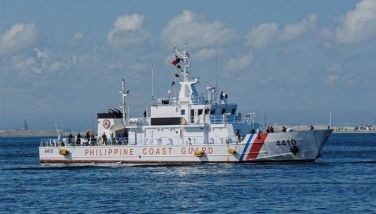Next president must strengthen ties in AsPac – analysts
MANILA, Philippines — Global geopolitical analysts said the next Philippine president must be prepared to strengthen ties with countries in the Asia-Pacific region and craft a national security strategy to deal with the continuing aggression of China, especially in the West Philippine Sea.
Professor Dindo Manhit, president of think tank Stratbase-Albert del Rosario Institute (Stratbase-ADRI), said that the next chief executive should be prepared to lead the Philippines in tapping its expansive network in securing the freedom of the West Philippine Sea and countering the aggressive behavior of Chinese maritime militia.
“The inherent multi-polarity and the emergence of traditional, non-traditional and evolving security threats have led to numerous challenges and geopolitical shifts,” Manhit said in a recent virtual forum with international geopolitical analysts and experts organized by Stratbase-ADRI.
“The people must choose a candidate with strategic thinking to appraise the complex dynamics of regional geopolitics and the respective leaders in the international arena. The next president must always be sensitive to the true will of the people,” he elaborated.
The maritime security issue in the West Philippine Sea remains a persistent and primary concern for the Philippines, and the next president should handle this issue decisively and firmly, Manhit added: “China’s aggressive behavior and expansionist agenda provide impetus for a strategic reassessment of the country’s foreign and security policy.”
Stratbase-ADRI recently launched the book titled, The Strategy of Denial: American Defense in an Age of Great Power Conflict, by former deputy assistant secretary of defense for strategy and force development, US Department of Defense, Elbridge Colby, which highlights the need for the United States, the Philippines, Taiwan, Japan and Australia to work together on various strategies to respond to China’s use of direct force to consummate an invasion.
“If China really wanted to reliably be able to coerce Manila, it would want the ability to use direct military force, and the reality is that China is going to have that ability,” Colby said. “I think the Philippines should concentrate much more on the high-end military scenario rather than the South China Sea gray zone.”
“The risk is that China will increasingly be able to have military escalation dominance so that if there is a conflict arising over, say, Scarborough Shoal, the Chinese will be able to impose their will, and they will resolve any issues in their favor,” Colby said.
Concurrently, Stratbase trustee and program convenor, Dr. Renato de Castro, author of a Stratbase-ADRI special paper titled, A National Security Strategy (NSS) for the 17th Philippine President: The Case for A Limited Balancing, stated that the Philippines is now at a crossroads on whether to continue the appeasement policy or adopt one of “limited hard balancing.”
De Castro pointed out that establishments are now questioning President Duterte’s policy of appeasement toward China in the past five years.
Despite Duterte’s manifest preferential treatment of China, it was noted that his administration failed to deliver the promised loans and direct investments to finance the Philippine government’s Build, Build, Build program. Instead, it only increased its naval presence and assertiveness near the artificial islands it constructed in the South China Sea.
“Now the defense, military and foreign affairs establishments are pushing for a strategy aimed at constraining China’s revisionist agenda in the South China Sea,” De Castro said.
“Limited hard balancing seeks to constrain China’s ability to unilaterally impose its preferences on the Philippines and other littoral states through limited arms build-up and reliance on diplomatic coalition of like-minded states that will defend their common interest to maintain a rules-based international order,” he added.
“The Philippines must leverage on existing and new multilateral organizations such as the European Union, the East Asian Summit, Quadrilateral Security Dialogue and the Australia, United States, and United Kingdom Security Partnership or AUKUS to uphold the rules-based international order,” De Castro further urged.
“The next President of the Philippines should prioritize multilateral and inclusive cooperation with like-minded states such as the US, Japan, Australia and India to ensure the maintenance of a rules-based international order and realization of a free and open Indo-Pacific region,” Manhit said.
“Beyond 2022, the Philippines must successfully contribute to building a more peaceful, prosperous and stable region,” he said.
- Latest
- Trending


























